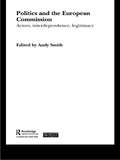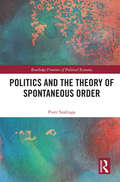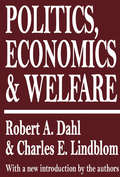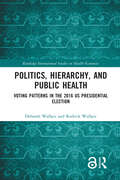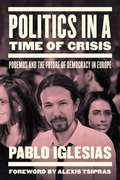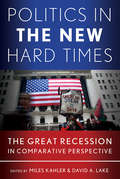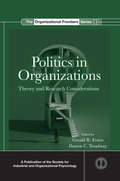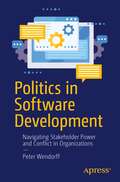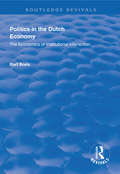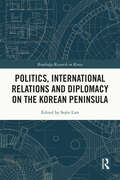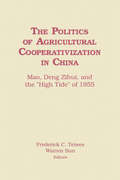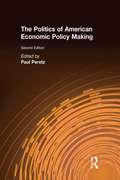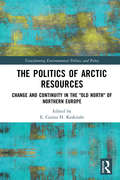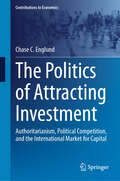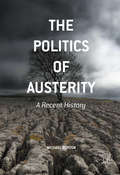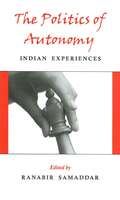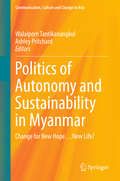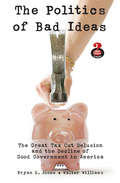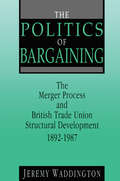- Table View
- List View
Politics and the European Commission: Actors, Interdependence, Legitimacy (Routledge/ECPR Studies in European Political Science #Vol. 36)
by Andy SmithThe European Commission is an organization which has come to fascinate or repulse a range of national politicians, journalists and social scientists. In contrast to the prevailing image of the Commission as a 'bureaucrat's paradise', however, and by using the results of original research, this book deliberately sets out to investigate this organization's relationship to politics. It does so first by developing a variety of case-studies (health, development aid, preparations for Eastern enlargement, etc.) as a means of studying the relationships, networks and interdependencies which link commissioners and Commission officials to national politicians, civil servants and interest groups. Second, by looking in detail at how the Commission publicizes its work, notably through producing public information and liaising with the media, fresh light is shone upon the complex question of the Commission's legitimacy. Politics and the European Commission provides a framework for generating new information about, and interpretations of, the power struggles at the heart of the EU.
Politics and the Theory of Spontaneous Order (Routledge Frontiers of Political Economy)
by Piotr SzafrugaThe theory of spontaneous order conceptualises and explains a number of institutional and social phenomena that are not an intended effect of either individual decisions or a collective consensus but an unplanned outcome of interactions between people pursuing their own aims. Drawing on these insights, this book demonstrates the utility of the theory of spontaneous order in explaining many phenomena in political economy and political science. The book opens with a discussion of the history and development of the theory of spontaneous order, particularly in economics and the Austrian School. The epistemological premises of the theory are then explored including the formulation of the central idea of social individualism. Demonstrating the potential applications of the theory of spontaneous order to politics, core ideas are examined including democracy, fragile states and the concept of the veil of ignorance. Finally, the limitations and constraints of the theory of spontaneous order are also reviewed and discussed. This book marks a valuable contribution to the literature on political economy, political science, public choice and political philosophy.
Politics, Economics, and Welfare
by Robert A. DahlFor most of this century, the habit of thinking about politics and economics in terms of grand and simple alternatives has exerted a powerful influence over the minds of those concerned with economic organization. Politics, Economics, and Welfare is a systematic attack on the idea of all-embracing ideological solutions to complex economic problems.
Politics, Finance and the Role of Economics: An Essay on the Control of Public Enterprise (Routledge Library Editions: Public Enterprise and Privatization)
by C. D. FosterOriginally published in 1971, when nationalized industries employed about 7 per cent of the national labour force, created about 10 per cent of the gross domestic product and had annual investment programmes which were equal to those of all private manufacturing put together. Even this understates the scope of public enterprise at the time, since there were many other organizations, ranging from the BBC to the Public Trustee, which were semi-autonomous public enterprises, but not nationalized industries. Moreover, the public enterprise sector continued to grow, even under Conservative governments, and there were many reasons for thinking that no government would succeed in reversing this trend, for it was felt unlikely that, as government became more complex, it would disgorge many new activities which would be given a semi-autonomous, that is, public enterprise status. The author, drawing on personal experience, shows that the facts of ministerial and parliamentary control were very different from what the public and Parliament thought at the time. He describes the very great practical independence of the Boards and also how much Ministers had come to rely on persuasion (which not only can impose serious waste of time and money on both Boards and Government but is also inefficient). Ministers have least power where the aims of public enterprise are social rather than commercial. If there were no changes, the growth of public enterprise to achieve social purposes would mean an important decline in the power of Parliament and Ministers. This book explores solutions to this problem and concludes that the government must build up a cadre and capacity for financial control which at the time were lacking to it.
Politics, Hierarchy, and Public Health: Voting Patterns in the 2016 US Presidential Election (Routledge International Studies in Health Economics)
by Deborah Wallace Rodrick WallaceSteep socioeconomic hierarchy in post-industrial Western society threatens public health because of the physiological consequences of material and psychosocial insecurities and deprivations. Following on from their previous books, the authors continue their exploration of the geography of early mortality from age-related chronic conditions, of risk behaviors and their health outcomes, and of infant and child mortality, all due to rigid hierarchy. They divide the 50 states into those that gave their electoral college votes to Trump and those that gave theirs to Clinton in the 2016 presidential election and compare the two sets for socioeconomic and public health profiles. They deliberately apply only simple standard statistical methods in the public health analyses: t-test, Mann-Whitney test, bivariate regression, and backward stepwise multivariate regression. The book assumes familiarity with basic statistics. The authors argue that the unequal power relations that result in eroding public health in the nation and, in particular, in the Trump-voting states, largely cascade from the collapse of American industry, and they analyze the Cold War roots of that collapse. In two largely independent chapters on economics, they explore both the suppression of countervailing forces, such as organized labor, and the diversion of technical resources to the military as essential foundations to the population-level suffering that expressed itself in the 2016 presidential election. This interdisciplinary book has several primary audiences: creators of public policies, such as legislators and governmental staff, public health professionals and social epidemiologists, economists, labor union professionals, civil rights advocates, political scientists, historians, and students of these disciplines from public health through the social sciences.
Politics, Identity, and Mexico’s Indigenous Rights Movements
by Todd A. EisenstadtDrawing on an original survey of more than 5,000 respondents, this book argues that, contrary to claims by the 1994 Zapatista insurgency, indigenous and non-indigenous respondents in southern Mexico have been united by socioeconomic conditions and land tenure institutions as well as by ethnic identity. It concludes that - contrary to many analyses of Chiapas's 1994 indigenous rebellion - external influences can trump ideology in framing social movements. Rural Chiapas's prevalent communitarian attitudes resulted partly from external land tenure institutions, rather than from indigenous identities alone. The book further points to recent indigenous rights movements in neighboring Oaxaca, Mexico, as examples of bottom-up multicultural institutions that might be emulated in Mexico and elsewhere in Latin America.
Politics in a Time of Crisis
by Pablo IglesiasA manifesto for a new, democratic left: a political programme poised to transform EuropeSince 2011, Pablo Iglesias has led Podemos, a new radical left party in Spain that is reframing the nature of modern politics. Under his guidance, the party has unmasked the ideological motives behind European austerity, revealing the true nature of this power grab conducted on behalf of elites intent on dismantling the welfare state. Here, Iglesias delineates his political vision. He skewers not only the Spanish establishment, but also the anti-democratic bloc comprising the Troika, corporate interests, and the "Wall Street Party." Politics in a Time of Crisis--which includes an in-depth interview with Iglesias--is an incisive examination of the current situation in Europe as well as a stirring call for international resistance.From the Trade Paperback edition.e whose lives are affected. The Great Recession, he shows, was an excuse to dismantle the welfare state and bolster the power of the elites.From the Trade Paperback edition.
Politics In The New Hard Times
by David A. Lake Miles KahlerThe Great Recession and its aftershocks, including the Eurozone banking and debt crisis, add up to the worst global economic crisis since the Great Depression of the 1930s. Although economic explanations for the Great Recession have proliferated, the political causes and consequences of the crisis have received less systematic attention. Politics in the New Hard Times is the first book to focus on the Great Recession as a political crisis, one with both political sources and political consequences. The authors examine variation in crises over time and across countries, rather than treating these events as undifferentiated shocks. Chapters also explore how crisis has forced the redefinition and reinforcement of interests at the level of individual attitudes and in national political coalitions. Throughout, the authors stress that the Great Recession is only the latest in a long history of international economic crises with significant political effects-and that it is unlikely to be the last. Contributors: Suzanne Berger, MIT; J. Lawrence Broz, University of California, San Diego; Peter Cowhey, University of California, San Diego; Peter A. Gourevitch, University of California, San Diego; Stephan Haggard, University of California, San Diego; Peter A. Hall, Harvard University; Miles Kahler, University of California, San Diego; Peter J. Katzenstein, Cornell University; Ikuo Kume, Waseda University; David A. Lake, University of California, San Diego; Megumi Naoi, University of California, San Diego; Stephen C. Nelson, Northwestern University; Pablo Pinto, Columbia University; James Shinn, Princeton University
Politics in Organizations: Theory and Research Considerations (SIOP Organizational Frontiers Series)
by Gerald R. Ferris Darren C. TreadwayThis edited volume in the SIOP Frontiers series is one of the first to look at the psychological factors behind politics and power in organizations. Noted contributors from schools of management, psychology, sociology and political science look at the theory, research, methodology and ethical issues related to organizational politics and climates. The book is divided into three parts: Part 1 looks at the historical evolution of the field; Part 2 integrates organizational politics with important organizational behavior constructs and/or areas of inquiry, for example in the chapter by Lisa Leslie and Michele Gelfand which discusses the implications of cross-cultural politics on expatriates and within cross-national mergers; and Part 3 focuses on individual differences and organizational politics, focusing on the nature of political relationships.
Politics in Software Development: Navigating Stakeholder Power and Conflict in Organizations
by Peter WendorffEquip yourself to navigate organizational politics in the world of software development. This book will help you understand the power dynamics at work between competing stakeholders with conflicting goals in projects and organizations. Politics in Software Development consists of three main parts. Author Peter Wendorff begins by defining key concepts in organizational politics. He then moves on to software development processes and investigates how their design reflects stakeholder interests. In the final part, he highlights the role of political skill in software development and provides an overview of tactics that stakeholders frequently use. There is widespread competition within organizations for rewards, recognition, status, and power. It gives rise to political behavior of stakeholders, which is generally seen as a problem. This negative view of organizational politics tends to overlook its positive functions. For example, it can also be thought of as an arena where stakeholders with conflicting goals can argue, persuade, negotiate, bargain, and cooperate to address conflicts. Political conflict resolution regularly happens in organizations in an entirely civilized manner. It helps find agreements that reconcile differences in a constructive way, and it is needed because stakeholder conflicts are simply a natural aspect of organizations. While there is much literature about organizational politics, very few authors consider the specifics of software development. This book addresses both subjects and is written for an audience interested in a political perspective on software development. What You'll LearnRecognize and understand political activities in organizationsUnderstand what software processes have to do with stakeholder power and interestsAcquire fundamental political skills for dealing with politics in software development Who This Book Is For Project managers, lead developers, team leaders, team coaches, product owners, business analysts, developers, and other software professionals. This book is also suitable for students in software engineering.
Politics in the Dutch Economy: The Economics of Institutional Interaction (Routledge Revivals)
by Bart SnelsFirst published in 1999, this volume surveys economic theories of political mechanisms as well as political theories of the influence of the institutional context in which decisions about social economic policies are being made. In the first half of the seventeenth century the Dutch Republic emerged as one of Europe's leading maritime powers. The political and military leadership of this small country was based on large-scale borrowing from an increasingly wealthy middle-class of merchants, manufacturers and regents This volume presents the first comprehensive account of the political economy of the Dutch republic from the sixteenth to the early nineteenth century. Building on earlier scholarship and extensive new evidence it tackles two main issues: the effect of political revolution on property rights and public finance, and the ability of the nation to renegotiate issues of taxation and government borrowing in changing political circumstances.
Politics, International Relations and Diplomacy on the Korean Peninsula (Routledge Research on Korea)
by Sojin LimThis edited volume explores the past, present, and future of the Korean Peninsula, with special focus on South Korea, by connecting developments in politics with those in international relations and diplomacy. The book focuses on how South Korea’s politics and international relations have evolved since the founding of the First Republic in 1948, with particular attention to the period surrounding the 2022 presidential election. The authors provide new insights into Korean politics, including South Korean electoral reform and relations with China and Japan, North Korea’s nuclear capacity, and North–South diplomacy. Beginning with a commentary by Colin Crooks, Britain’s current Ambassador to South Korea and former Ambassador to North Korea, on recent British foreign policy changes and UK–Korea relations, this book will appeal to scholars and students of politics, international relations, diplomacy, and Korean Studies.
Politics of a Guaranteed Income: The Nixon Administration and the Family Assistance Plan
by Daniel P. MoynihanA prominent Democrat discusses The Nixon Administration and the Family Assistance Plan.
The Politics of Advanced Capitalism
by Pablo BeramendiThis book serves as a sequel to two distinguished volumes on capitalism: Continuity and Change in Contemporary Capitalism (Cambridge, 1999) and Order and Conflict in Contemporary Capitalism (1985). Both volumes took stock of major economic challenges advanced industrial democracies faced, as well as the ways political and economic elites dealt with them. However, during the last decades, the structural environment of advanced capitalist democracies has undergone profound changes: sweeping deindustrialization, tertiarization of the employment structure, and demographic developments. This book provides a synthetic view, allowing the reader to grasp the nature of these structural transformations and their consequences in terms of the politics of change, policy outputs, and outcomes. In contrast to functionalist and structuralist approaches, the book advocates and contributes to a 'return of electoral and coalitional politics' to political economy research.
The Politics of African Industrial Policy
by Lindsay WhitfieldThis book engages in the debate on growth versus economic transformation and the importance of industrial policy, presenting a comprehensive framework for explaining the politics of industrial policy. Using comparative research to theorize about the politics of industrial policy in countries in the early stages of capitalist transformation that also experience the pressures of elections due to democratization, this book provides four in-depth African country studies that illustrate the challenges to economic transformation and the politics of implementing industrial policies.
The Politics of Agricultural Cooperativization in China: Mao, Deng Zihui and the High Tide of 1955
by Frederick C Teiwes Hongyi Lai Lai Hongyi Warren SunThe decision to initiate a High Tide of agricultural co-operativisation in 1955 in China, is documented in this text. The social impact, policy conflict and leadership style of Mao is detailed, drawing upon documentary sources, interviews with Party historians, and a chronology of events.
The Politics of Aid Selectivity: Good Governance Criteria in World Bank, U.S. and Dutch Development Assistance (Routledge Studies In Development Economics Ser.)
by Wil HoutThe first extended analysis of selectivity policies of important bilateral and multilateral aid donors, this book combines a policy-analytical with a quantitative-empirical approach. Bringing out the conflicts that may exist between foreign assistance agendas and the desire of governments in developing countries to set priorities for their national
The Politics of American Economic Policy Making
by Paul PeretzA reader on American government and the economy. It contains wide-ranging articles by people such as Richard Musgrave, Milton Friedman, James Buchanan, and Alan Greenspan.
The Politics of Arctic Resources: Change and Continuity in the "Old North" of Northern Europe (Transforming Environmental Politics and Policy)
by E. C. H. KeskitaloThe Arctic has often been seen as a natural area, or even a “wilderness”, where mainly indigenous and subsistence activities have been prominent. Contrary to this, the present volume highlights the very long historical development of resource use systems in northern Europe, across multiple actors and multiple levels, and including varying population groups. The book takes a past-present-future perspective that illustrates the paths to institutional emergence, change or persistence over time. It also illustrates how institutions may themselves drive changes, through a focus on resource use cases in northern Europe. This volume demonstrates that understanding “northern” issues is less about understanding sets of geophysical, climatological or environmental conditions than about understanding social and institutional structures. Understanding these trajectories into the future is seen as a key way of understanding what responses to future change may be likely and what the institutions are that will shape, limit or enable our responses to climate change. This book will be of great use to scholars and graduates in the fields of Arctic and northern-region politics, and to researchers of resource use and climate change with a focus on vulnerability, social vulnerability, adaptation and mitigation.
The Politics of Attracting Investment: Authoritarianism, Political Competition, and the International Market for Capital (Contributions to Economics)
by Chase C. EnglundThis book provides a tour through a novel theoretical approach to understanding the political economy of authoritarianism and the international market for capital investment. As the author demonstrates through an extensive series of analysis, success in attracting investment (and ultimately fostering growth) lies with the ability of the state to reduce investors’ uncertainty. The author explores the market for FDI in nondemocratic states and finds that those states which feature reduced competition over policy between “economic elites” are more likely to attract investment inflows. However, these inflows are the result of incentives provided as private benefits for incumbent elites, and tend to result in concentrated inflows. In Part II, this is contrasted with the way democratic states attract investment through institutional protections and public benefits. In this way, the author uncovers that authoritarian and democratic states achieve investor confidence through “alternate paths to predictability”, one based on eliminating opposition through political consolidation and the other based on impartial rules and legal protections designed to constrain the excesses of political competition. The theory’s central premise, that the concentration of economic influence with fewer “economic elites” is corrosive to political competition and institutional quality, carries huge significance for the study of both authoritarian and democratic governance quality.
The Politics of Austerity
by Michael BurtonThis book considers the relationship between public spending and public deficit and the varying successes and difficulties governments have had in recent years to balance the two. As the fiscal crash of 2007/8 turned into the Great Recession and tax revenues tumbled, public finances across the UK, the USA and Europe plunged into deficit. Controversial attempts by governments to balance their budgets, commonly described as austerity by critics, had mixed success, politically and economically. Michael Burton outlines how politicians tackled the worst economic downturn in over half a century, drawing on previous examples of deficit-reduction to see how governments managed public finances in recessions and where austerity worked and where it failed. This two-part book, which for the first time provides an historical context to austerity, analyses firstly deficit-reduction in the UK in the 1970s, 1980s, 1990s and 2010-2016, and then looks at case studies in Europe, the USA, Canada and Asia Pacific. The author concludes that with the ageing population placing greater pressure through health and pensions on the public finances of the developed world, politicians and their electorates will have to learn to live long-term with austerity.
The Politics of Autonomy: Indian Experiences
by Ranabir SamaddarThis volume tells us that a critical inquiry into the idea of autonomy suggests that the politics of the future will be the politics of autonomies: an engagement that combines notions like self-government, women`s autonomy, devolution of power, the rights of minorities, greater popular access to resources, and legal pluralism, and where different autonomies must learn to negotiate and co-exist. Viewing democratic theory through the lens of autonomy, the contributors: - argue that autonomy has to be an essential ingredient in the building of post-colonial democracies, not merely a residual measure to keep some constituencies happy; - draw attention to the contending principles of autonomy, the consequent politics of autonomies, the inescapable co-existence of autonomies, and the need for dialogue; and - analyze the instructive Indian politico-historical experience because of its diversity and range, the extent of colonial institutionalization, multiple forms of autonomy, the complex path of constitutionalism, a wide variety of accords, and the unyielding state that is determined to keep the nation intact. In the process, the contributors traverse a wide range of issues relating to women`s autonomy, peace accords, the nature of federalism in the Indian Constitution, autonomy in international law, and the fiscal decentralization. These debates are then supported by case studies on the autonomy experiments in Kashmir, Darjeeling, and the entire Northeast, and on fiscal devolution.
Politics of Autonomy and Sustainability in Myanmar
by Walaiporn Tantikanangkul Ashley PritchardThis book focuses on the tensions between and conflict resolution processes concerning minority ethnic groups in Myanmar's rural areas and the State. It covers topics such as relations and communication between the central government, the Kokang Chinese community and the Kachin State; the impact of cyclone Nargis on remote settlements in the Ayeyarwady Delta; the impact of depletion of mangrove forests and Yangon's fuel needs on a Karen minority group; and the collapse of a community forestry project in a Pa-O village in Shan State. Written by young scholars from Myanmar, some of whom belong to minority groups, the book provides firsthand reporting and scholarship that, for the past sixty years, have not been available. Offering in-depth, unique insights into minority change issues in the interior and at the periphery of Myanmar, as seen from local perspectives, it offers a valuable resource for academics, students and researchers in the fields of sustainable development, social and political studies, and development communication in Asia.
The Politics of Bad Ideas: The Great Tax Cut Delusion and the Decline of Good Government in America
by Bryan Jones Walter WilliamsThis highly anticipated addition to the "Great Questions in Politics" series offers a provocative argument about the persistence of bad ideas in shaping American economic policy. The result of a collaboration between political scientist Bryan D. Jones and economist Walter Williams, The Politics of Bad Ideas is indispensable reading for any study of American government, public policy, or economic and budgetary analysis. The Politics of Bad Ideas examines why, over the last quarter century, bad economic ideas -- such as cutting taxes without cutting spending -- have become so influential in shaping government policies. Using in-depth research and trenchant political and economic analysis, the book explores why those bad ideas continue to survive despite overwhelming evidence that they in fact cause damage to the federal government's long-term fiscal stability and the American economy.
The Politics of Bargaining: Merger Process and British Trade Union Structural Development, 1892-1987
by Jeremy WaddingtonFirst published in 1995. Routledge is an imprint of Taylor & Francis, an informa company.
